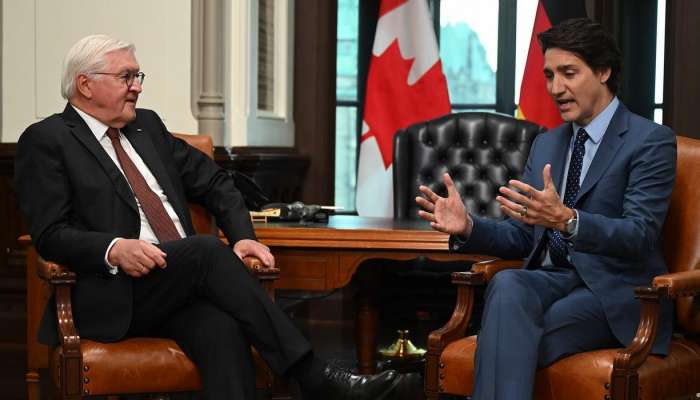
Ottawa: Prime Minister Justin Trudeau met with Frank-Walter Steinmeier in Ottawa for talks on the second day of the German president's trip to Canada.
Steinmeier arrived in Canada on Sunday for a four-day visit, with a number of business priorities topping the agenda. Discussions about the war in Ukraine and China was also on the table.
In the meeting with Steinmeier, Trudeau praised Germany's leadership and role in Group of Seven (G7) major economies and said both countries were committed to keeping up the support for Ukraine.
The two leaders signed an agreement announced days earlier, where Canada and Volkswagen committed more than 20 billion Canadian dollars ($14.8 billion, €13.3 billion) for a battery gigafactory in St. Thomas, Ontario.
The German car giant is investing up to 7 billion Canadian dollars to build the plant, making it the biggest single investment ever in Canada's electric-vehicle supply chain.
Originally slated as a state visit, Steinmeier's hosts were forced to tone down his reception as a result of ongoing strikes. It is now categorised as an official visit, rather than a state visit.
Steinmeier says democracy also 'critical infrastructure'
Steinmeier told Canada's Governor General Mary Simon in Ottawa they have to avoid "being politically and economically vulnerable."
"Our democracy is also critical infrastructure. Let's preserve and protect it against attacks from within and without," he said, in a reference to Russia's invasion of Ukraine.
Besides the Russian threat to the global order, the German president said that China's "claim to economic and political power will shape the future of international relations in the long term."
He said Canada plays an important role as part of efforts to counter China's growing influence in the Indo-Pacific.
Germany and Canada shared a common goal as they both "want to expand our networking with the states in the region in order to reduce untilateral dependencies on China."
Steinmeier is traveling with wife Elke Büdenbender, Minister for Education and Research Bettina Stark-Watzinger and a large German business delegation.
Because his is a state visit, the German president was afforded no military welcome upon arrival. A scheduled state dinner — hosted by Governor General Mary Simon, King Charles III's representative in Canada — meant to take place Monday evening was also canceled.
Instead, he had a private lunch at the home of the German ambassador.
The entourage will fly to western Vancouver on Tuesday to visit a German fuel-cell manufacturer, take part in a roundtable discussion between German and Canadian business leaders, and get an introduction to a pilot project for smart energy systems currently being developed by the University of British Columbia.
The visit will end Wednesday with a trip to Tuktoyaktuk, a 900-person community in the Arctic Circle, to see the effects of climate change firsthand.
Steinmeier's visit was preceded by one last August from Chancellor Olaf Scholz and Vice-Chancellor Robert Habeck. That meeting saw the two pen deals for longterm cooperation on the production and transport of hydrogen.
Germany has sought to diversify its energy and supply chains after getting caught flat-footed by its dependencies on Russia and China.
In December, Berlin ratified the EU-Canada Trade Agreement (CETA) and is now keen on securing access to Canada's rich supply of natural resources such as gas, oil and minerals.